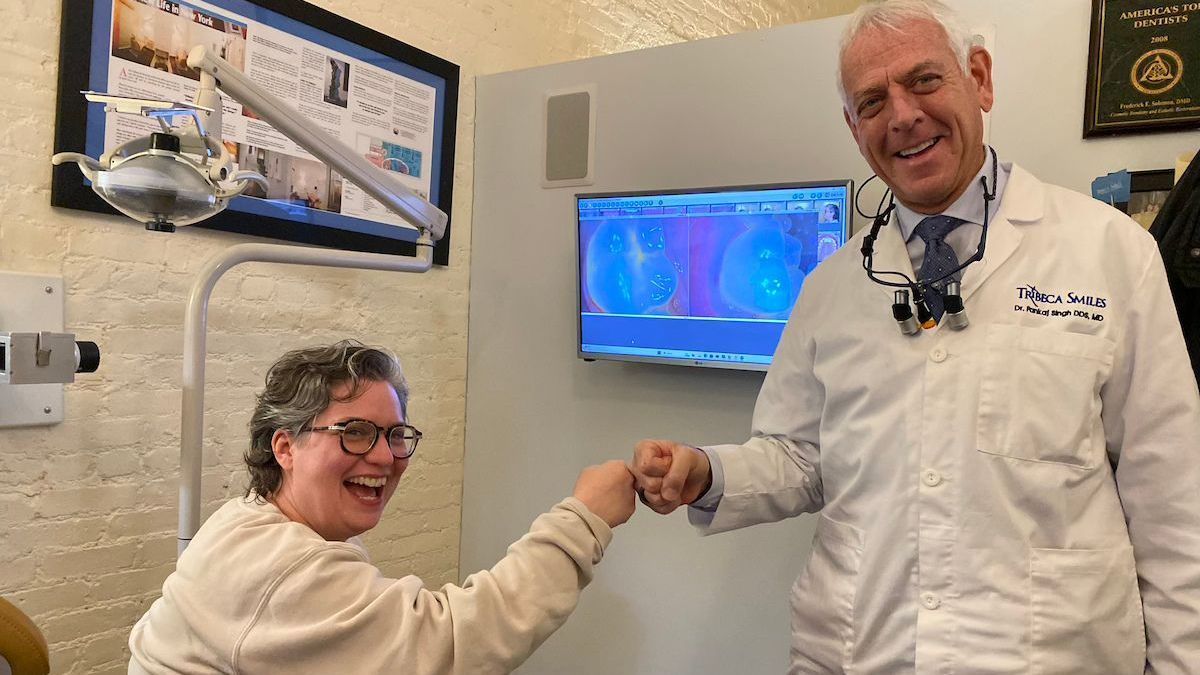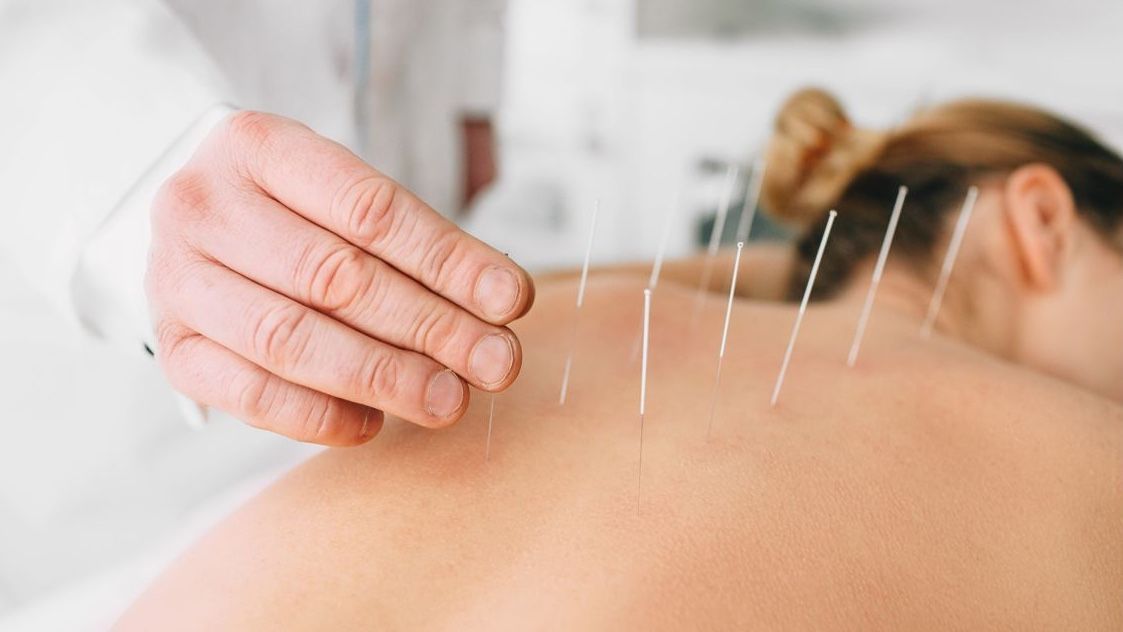How Can Acupuncture Help with Tooth Extraction Pain?
Key Takeaways
- Acupuncture for tooth extraction reduces pain, swelling, and anxiety through natural mechanisms that work with your body's healing systems
- Dr. Danielle Solomon at Tribeca Smiles brings over 20 years of Traditional Chinese Medicine experience, helping patients need less pain medication and experience longer pain-free periods after extractions
- This ancient technique is safe when performed by qualified practitioners and works as a complement to regular dental care, not a replacement
| Table of Contents: |
|---|
| 1. What Makes Acupuncture Help with Tooth Extraction Pain |
| 2. Managing Dental Anxiety Before Your Extraction |
| 3. Pain Management During and After Extraction |
| 4. Controlling the Gag Reflex Problem |
| 5. Speeding Up Your Recovery |
| 6. What Are the Risks and Side Effects? |
| 7. Finding the Right Practitioner |
| 8. Combining Acupuncture with Other Comfort Measures |
| 9. Real Results from Research |
| 10. When to Consider Acupuncture for Your Extraction |
| 11. What Happens During Your Acupuncture Session at Tribeca Smiles? |
| 12. The Bottom Line on Acupuncture for Tooth Extraction |
| 13. How Can Dr. Danielle Solomon's Acupuncture Help with Your Tooth Extraction? |
| 14. Frequently Asked Questions |

What Makes Acupuncture Help with Tooth Extraction Pain
You might wonder - how can needles placed in specific body points affect tooth pain? The answer involves both ancient wisdom and modern science.
The Science Behind the Needles
When an acupuncturist inserts needles into specific points, several things happen in your body:
- Nerve Signal Changes: The needles interfere with pain signals traveling to your brain. Think of it like scrambling a radio signal - the pain message gets disrupted before reaching its destination.
- Natural Painkiller Release: Your body produces its own pain-relieving chemicals called endorphins. Acupuncture triggers this release, similar to what happens during exercise but without breaking a sweat.
- Blood Flow Improvement: The treatment increases circulation in targeted areas, bringing oxygen and nutrients while removing waste products. Better blood flow means faster healing.
- Inflammation Reduction: Research shows acupuncture decreases inflammatory chemicals in your body. Less inflammation equals less swelling and discomfort after extraction.
Traditional Understanding Meets Modern Medicine
Traditional Chinese Medicine views health as energy (Qi) flowing through pathways in your body. When this flow gets blocked, problems arise. While this might sound abstract, modern research confirms that acupuncture points often correspond to areas with high nerve density or blood vessel concentration.
Managing Dental Anxiety With Acupuncture Before Tooth Extraction
For many people, fear of the dentist ranks right up there with public speaking. If you're someone who gets nervous just thinking about dental work, you're not alone - studies show 4% to 30% of adults experience significant dental anxiety.
How Acupuncture Calms Pre-Procedure Nerves
Research demonstrates that acupuncture affects brain regions controlling emotions and stress responses. Here's what happens:
- Cortisol levels drop (that's your main stress hormone)
- Heart rate slows down to a more relaxed pace
- Muscle tension releases throughout your body
- Breathing becomes deeper and more regular
One study found patients receiving acupuncture before dental procedures reported feeling significantly calmer compared to those who didn't. The interesting part? This relaxation isn't just in your head - blood tests confirm actual changes in stress hormones.
What to Expect During Pre-Extraction Acupuncture
If you choose acupuncture before your extraction at a practice offering integrative dentistry, here's the typical process:
- Consultation: Your practitioner asks about your health history and specific concerns
- Point Selection: They choose acupuncture points based on your needs - some might be near the extraction site, others on your hands or feet
- Needle Insertion: Ultra-thin needles (much smaller than injection needles) are placed gently
- Relaxation Time: You rest for 20-30 minutes while the treatment works
- Needle Removal: The practitioner removes all needles
Most people describe feeling deeply relaxed, sometimes even falling asleep during treatment.
Pain Management During and After Extraction
Nobody looks forward to tooth extraction pain. While local anesthetic handles pain during the procedure, what about afterward? This is where acupuncture shines.
The Research on Post-Extraction Pain
Multiple studies have examined acupuncture's effectiveness for dental pain:
- Longer pain-free periods: One study found acupuncture patients experienced an average of 173 minutes without pain versus 94 minutes for the placebo group
- Less medication needed: Patients using acupuncture took fewer pain pills (1.1 tablets versus 1.65 on average)
- Lower pain intensity: When pain did occur, acupuncture users rated it as less severe
Specific Benefits for Different Types of Dental Pain
Not all tooth pain responds equally to acupuncture:
Most Effective For:
- Gum inflammation pain
- Post-extraction discomfort
- TMJ-related pain
- General tooth sensitivity
Less Effective For:
- Acute infection pain
- Deep cavity pain requiring immediate dental treatment
Remember - acupuncture manages symptoms but doesn't fix cavities or infections. You still need proper dental treatment for the underlying problem.
Controlling the Gag Reflex Problem
Ever felt like you were going to gag during dental x-rays or when the dentist works on back teeth? You're not alone. For some people, this reflex makes dental work nearly impossible.
How Acupuncture Helps
Case studies show ear acupuncture can control gagging in 8 out of 10 patients completely, with partial control in the remaining 2. The treatment works by:
- Calming the nervous system
- Reducing sensitivity in the throat area
- Helping patients feel more in control
This can make the difference between completing necessary dental work and having to stop mid-procedure.
Speeding Up Your Recovery
After tooth extraction, your body needs to heal the socket where the tooth was. Acupuncture can help this process in several ways.
Enhanced Healing Through Better Circulation
When blood flow improves to the extraction site, several good things happen:
- Oxygen delivery increases - cells need oxygen to repair tissue
- Nutrient supply improves - building blocks for new tissue arrive faster
- Waste removal speeds up - inflammatory byproducts clear out quicker
- Immune cells arrive faster - helping prevent infection
Reducing Post-Extraction Swelling
Facial swelling after tooth extraction isn't just uncomfortable - it can slow healing. Acupuncture reduces swelling by:
- Decreasing inflammatory chemicals
- Improving lymphatic drainage
- Promoting better fluid balance in tissues
Many patients report less "chipmunk cheek" when using acupuncture alongside standard post-extraction care.

What Are the Risks and Side Effects?
Like any medical treatment, acupuncture has potential side effects, though they're generally mild.
Common Side Effects (Usually Minor)
- Slight soreness at needle sites
- Small bruises occasionally
- Light bleeding when needles are removed
- Temporary fatigue after treatment
Who Should Avoid Acupuncture?
Certain conditions make acupuncture inappropriate:
Absolute No-Go Situations:
- Active skin infections
- Severe bleeding disorders
- Uncontrolled movements
- Pacemakers (for electroacupuncture)
Use Caution With:
- Pregnancy (certain points avoided)
- Blood thinning medications
- Diabetes
Compromised immune systemsons and medications before treatment.
Finding the Right Practitioner
Not all acupuncture is created equal. For dental applications, you want someone with specific experience.
Questions to Ask
- Are you licensed? Check your state's requirements
- Do you have experience with dental patients?
- How do you ensure needle sterility? (Should use single-use, disposable needles)
- Do you work with dentists? Coordination between providers improves outcomes
At practices offering bothdental services and acupuncture, this coordination happens naturally.
Combining Acupuncture with Other Comfort Measures
Acupuncture works well alongside other anxiety and pain management techniques.
Complementary Approaches
- Nitrous oxide for immediate anxiety relief during procedures
- Ice packs for swelling reduction
- Prescribed pain medication when needed
- Saltwater rinses for healing promotion
The goal isn't replacing these methods but enhancing overall comfort and recovery.
Real Results from Research
Let's look at what studies tell us about outcomes:
Pain Management Success Rates
A meta-analysis (study of studies) found:
- Patients using acupuncture experienced significantly less pain on day 1 post-surgery
- Opioid pain medication use decreased with acupuncture treatment
- Both manual and electrical acupuncture showed benefits
Anxiety Reduction Findings
Research on dental anxiety shows:
- Statistically significant anxiety reduction compared to no treatment
- Effects comparable to some anti-anxiety medications
- Patients report feeling more willing to return for future dental care
When to Consider Acupuncture for Your Extraction
Acupuncture might benefit you if:
- You experience high dental anxiety
- You prefer natural pain management options
- You've had difficult recoveries from previous extractions
- You want to minimize medication use
- You have a sensitive gag reflex
Talk to your dentist about incorporating acupuncture into your treatment plan. Many modern dental practices recognize the value ofintegrative approaches.
What Happens During Your Acupuncture Session at Tribeca Smiles?
Understanding the process helps reduce any nervousness about trying acupuncture.
Before Your Extraction
- Arrival: Come wearing comfortable clothing
- Discussion: Practitioner reviews your concerns and medical history
- Examination: Quick check of your pulse and tongue (traditional diagnostic methods)
- Treatment: Needles placed based on your specific needs
- Rest: Quiet time while treatment works (usually 20-30 minutes)
After Your Extraction
Post-extraction acupuncture follows a similar pattern but focuses on:
- Pain relief points
- Anti-inflammatory points
- Points promoting healing
Sessions might continue for several days post-extraction, depending on your healing progress.
The Bottom Line on Acupuncture for Tooth Extraction
Research supports acupuncture as a safe, effective complement to standard dental care for tooth extractions. While it won't replace the need for proper dental treatment or eliminate all discomfort, many patients find it significantly improves their experience.
The key benefits include:
- Natural pain management
- Reduced anxiety
- Faster healing
- Fewer medications needed
- Minimal side effects
If you're facing a tooth extraction and want a more comfortable experience, discussing acupuncture with your dental team makes sense. Whether you're dealing withemergency dental needs or planning a scheduled extraction, this ancient practice offers modern benefits backed by research.
For those in New York seeking comprehensive dental care that includes acupuncture options, exploring practices that offer both traditional and complementary treatments can provide the best of both worlds. The goal is making your necessary dental care as comfortable and healing-focused as possible.

How Can Dr. Danielle Solomon's Acupuncture Help with Your Tooth Extraction?
If you need a tooth extraction and want to minimize pain and anxiety, Dr. Danielle Solomon can help. With over 20 years of Traditional Chinese Medicine expertise, she's a licensed acupuncturist (L.Ac.) in both New York and New Jersey, holding advanced degrees from Pacific College of Oriental Medicine.
Dr. Solomon specializes in making tooth extractions more comfortable through acupuncture. Her patients report:
- Less anxiety before the procedure
- Reduced pain after extraction
- Faster healing times
- Fewer pain medications needed
"My goal is to help you feel better naturally," says Dr. Solomon. "Traditional Chinese Medicine offers a holistic approach to healing that can address a wide range of health concerns. I am dedicated to supporting my patients on their healing journey."
At Tribeca Smiles in Manhattan, Dr. Solomon integrates acupuncture specifically for dental procedures, focusing on pain management, anxiety reduction, and post-extraction healing. She also helps with related issues like TMJ pain, gag reflex control, and general dental fear.
Schedule your consultation today to learn how Dr. Solomon's acupuncture approach can help with your upcoming tooth extraction. Contact Tribeca Smiles to discuss integrating acupuncture into your extraction treatment plan.
Frequently Asked Questions
Does acupuncture hurt?
Most people barely feel the needles going in. They're much thinner than injection needles. You might feel a slight pinch or tingling sensation.
How many sessions will I need?
This varies by individual. Some people benefit from one pre-extraction session, while others prefer treatments before and after the procedure.
Can I drive after acupuncture?
Some people feel very relaxed or slightly drowsy after treatment. Plan accordingly, especially for your first session.
Will my dentist do the acupuncture?
Usually, a licensed acupuncturist performs the treatment, though some dentists have additional acupuncture training.
How soon before my extraction should I start acupuncture?
Ideally, begin a few days to a week before for anxiety management. Discuss timing with your practitioner.
What if I'm scared of needles?
Ironically, many needle-phobic patients tolerate acupuncture well because the needles are so different from injection needles. Discuss concerns with your practitioner.


